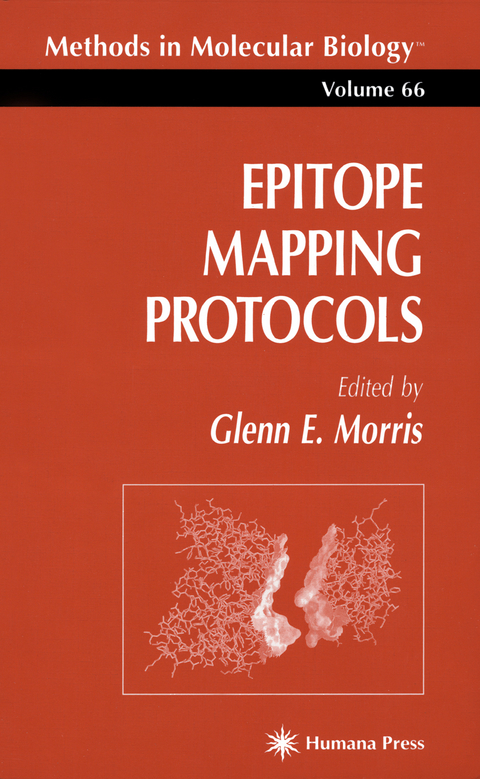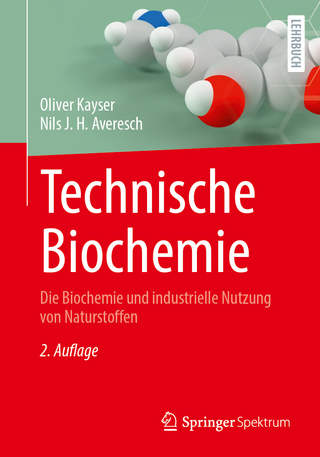
Epitope Mapping Protocols
Humana Press Inc. (Verlag)
978-0-89603-375-7 (ISBN)
Overview.- Crystallographic Studies of Antigen-Antibody Interactions.- Epitope Mapping Antibody-Antigen Complexes by Nuclear Magnetic Resonance Spectroscopy.- Mapping Epitopes on Antigens by Immunodiffusion in Gel.- A Simple Solid-Phase Competition Assay with Labeled Antigen.- Epitope Mapping by Antibody Competition.- Epitope Mapping by Surface Plasmon Resonance in the BIAcore.- Identifying Residues in Antigenic Determinants by Chemical Modification.- Epitope Mapping by Differential Chemical Modification of Antigens.- Epitope Mapping by Proteolysis of Antigen-Antibody Complexes.- Proteolytic Fragmentation for Epitope Mapping.- Epitope Mapping by Chemical Fragmentation.- Probing Antibody-Antigen Interactions by Mass Spectrometry.- Epitope Mapping Using Multipin Peptide Synthesis.- SPOT Synthesis.- Tea Bag Synthesis of Positional Scanning Synthetic Combinatorial Libraries and Their Use for Mapping Antigenic Determinants.- Epitope Mapping Using Phage-Displayed Peptide Libraries.- Reiterative Screening of Phage-Display Peptide Libraries with Antibodies.- Homolog Scanning.- Epitope Mapping Using an Oligonucleotide Replacement Method.- Epitope Mapping by Region-Specified PCR Mutagenesis.- Random Fragment Libraries Using Yeast Expression Plasmid.- Epitope Mapping Using Random Fragment Expression Libraries in ? Phages.- Random Fragment Libraries Displayed on Filamentous Phage.- Epitope Mapping by Expression of Restriction Enzyme or PCR Fragments in Bacterial Plasmids.- Epitope Mapping of Protein Antigens by Expression-PCR (E-PCR).- Epitope Mapping on Extracellular Domains of Cell-Surface Proteins Using Exonuclease III.- An Improved Method for Mapping Epitopes of Recombinant Antigens by Transposon Mutagenesis.- Incomplete Polypeptides of In Vitro Translation for EpitopeLocalization.- T-Cell Epitope Mapping with Synthetic Peptides and Peripheral Blood Mononuclear Cells.- Use of Natural or Selected Mutants and Variants for Epitope Mapping.- Production of Panels of Monoclonal Antibodies by the Hybridoma Method.- Production of Phage-Display Antibodies for Epitope Mapping.
| Erscheint lt. Verlag | 1.8.1996 |
|---|---|
| Reihe/Serie | Methods in Molecular Biology ; 66 |
| Zusatzinfo | XV, 416 p. |
| Verlagsort | Totowa, NJ |
| Sprache | englisch |
| Maße | 152 x 229 mm |
| Themenwelt | Naturwissenschaften ► Biologie ► Biochemie |
| Naturwissenschaften ► Biologie ► Genetik / Molekularbiologie | |
| Naturwissenschaften ► Biologie ► Zellbiologie | |
| ISBN-10 | 0-89603-375-9 / 0896033759 |
| ISBN-13 | 978-0-89603-375-7 / 9780896033757 |
| Zustand | Neuware |
| Informationen gemäß Produktsicherheitsverordnung (GPSR) | |
| Haben Sie eine Frage zum Produkt? |
aus dem Bereich


